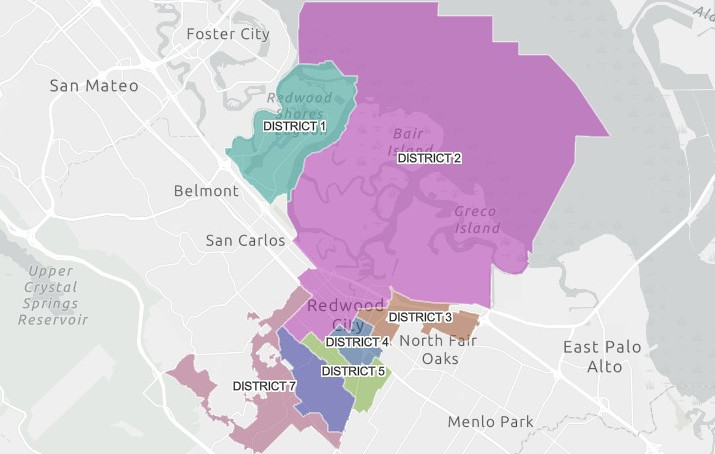Legendary baseball Hall of Famer Satchel Paige, in his rules for how to stay young, wrote, “Don’t look back. Something might be gaining on you.”
Alas, as we forge ahead into the 2020 Redwood City Council election, with brand spanking new districts, we must look over our shoulder just a bit to Monday evening. The current council decided unanimously to proceed with an election in District 4 and allow Michael Smith to appear on the ballot, even though he is running unopposed.
What interests me more than the decision is that the question prompted a remarkably angry denunciation of district elections as a failure and farce. I’m paraphrasing. The anger went on much longer.
Well, that’s just wrong, not to mention ridiculously premature. Not a single vote has been cast in three districts where there are contested races that promise to be vigorous. It’s like opening your first gift on Christmas morning and finding socks. And then deciding there’s no point in opening any other presents. You never know. There might be a bike hidden behind the tree.
Meanwhile, about those three districts. Yes, the pandemic response will be an issue. So will funding for police services and the economic crisis facing the city and its business community. But these are four-year seats and when it comes to political issues in Redwood City, the angle of repose is set on growth and development.
DISTRICT 1: Planning Commissioner Nancy Radcliffe versus former Councilmember Jeff Gee.
This is the district carved out for Redwood Shores. It’s the wealthiest district in the city and has the highest concentration of Asian-Americans — 39 percent, nearly four times higher than any other district.
When the council created districts, there was a widespread expectation that Gee, a longtime resident, would run for this seat. He announced for re-election in 2018 and then dropped out. Gee was targeted — sometimes on a personal level — by residents who were unhappiest with the growth and development that transformed downtown into a regional center and accommodated an increasing urbanization occurring throughout the Peninsula.
Even now, it appears the campaign is likely to be about those issues.
Radcliffe, a renter who moved to Redwood Shores two years ago, has been on the Planning Commission for 20 years, which has put her in the middle of many of the decisions that have changed Redwood City. But more recently, she has tempered her support and been a more difficult vote for development.
For a person with such a long public career and service on hosts of public and community committees, she has had a remarkably low political profile. Even now, a social media search turns up little on her, other than her Planning Commission tenure. Her personal financial disclosure statement — required from every public servant — lists no reportable investments or holdings.
DISTRICT 3: Councilmember Janet Borgens versus Isabella Chu and Lissette Espinoza-Garnica.
This district covers the Friendly Acres neighborhood in southern Redwood City and is one of the two minority-majority districts — 71 percent Hispanic, 64 percent renters, 62 percent of households with an annual income below $75,000 and only 20 percent with a college or graduate degree.
Borgens, a resident for more than 50 years, is seeking her second term. She was on the Planning Commission prior to her election, and she supported many of the changes to the city’s profile. But as a candidate she said it was time to pull the reins. Now, she is looking to broaden her appeal and her candidate ballot statement is a smorgasbord of district concerns. “I’m a strong voice at City Hall of residents, including our Latino families and Millennials starting families. Addressing racism and how we truly protect our community has made my voice stronger,” she wrote.
Still, this is a district where residents might feel that the city’s economic expansion passed them by and there may be a larger appetite for development that also might bring jobs and more housing.
That turf was staked out long ago by Chu, the leading voice of Redwood City Forward, an organization that supports smart growth and expansion. She also chairs the Friendly Acres Neighborhood Association. “I believe that Redwood City residents are progressive and practical and want our city to adapt to meet changing circumstances of the 21st century,’ she wrote on her campaign Facebook page.
Espinoza-Garnica is the newcomer, a young voice, self-described in their candidate statement as a “first-generation, queer, non-binary Chicanx.” They said “our neighborhood too often is neglected,” and they openly called for a reinvestment of the city’s $48.9 million police budget and for more affordable housing in the district.
DISTRICT 7: Councilmember Alicia Aguirre versus Chris Rasmussen and Mark Wolohan.
This district, which runs west of Alameda de las Pulgas up to Farm Hill, is one of the centers of greatest resistance to development.
It’s at the other end of the spectrum from District 3. It is 70 percent White and only 17 percent Hispanic, which is of note since Aguirre is the only Latino on the council. It’s also the second-wealthiest, behind District 1, but it has more homes than any other district — 87 percent single family residences, and 79 percent of the residents are home owners.
Aguirre, a councilmember for 15 years, is seeking her fourth full term and was part of the coalition that built the city’s downtown. She is running as someone who experienced the 2009 recession, equipping her to handle the present and future, pandemic-driven fiscal crisis.
Her principal opponent is Rasmussen, recently retired from the city police department and widely known for his high-profile work as the city’s community police officer. He has been praised, particularly, for his work with the homeless. Backed by the residentialist-inclined activists involved with the Redwood City Residents Say What? Facebook page, Rasmussen is off to an energetic start, with campaign signs already dotting the district. In his candidate statement, he said, quite directly, “It is time for new leadership” on the council.
The political newcomer is Wolohan, a lifelong resident and renter, who promises to bring a “fresh and holistic perspective’ to the council, which apparently includes an extensive effort at ending school consolidations. He also said his campaign will be “entirely self-funded, without campaign contributions from developers or anyone else.”
Contact Mark Simon at mark.simon24@yahoo.com.
*The opinions expressed in this column are the author’s own and do not necessarily reflect the views of Climate Online.






